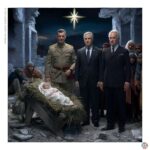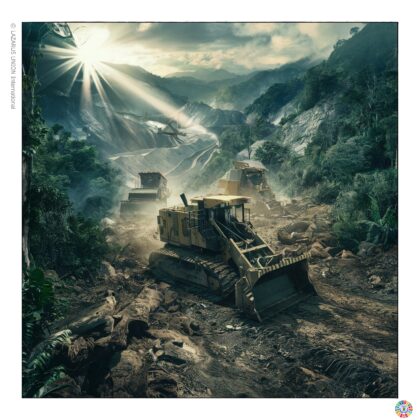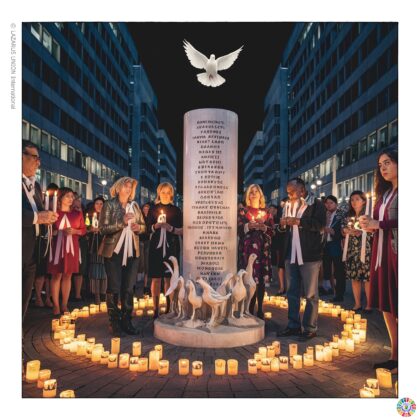This year’s International Zero Waste Day focuses on fashion and textiles. The earth is a victim of fashion. Thousands of chemicals are often used in the production of textiles, many... Read more
Nativity Story 2024
“BEING DETERMINES CONSCIOUSNESS” (K. Marx)
An alternative Christmas story
In a small town, perhaps somewhere between the bombed-out houses of Ukraine, the dusty camps of South Sudan or the burning rubble of the Middle East, something unexpected happened. It was a cold, silent evening, the sky cloudy with smoke and tears. In the midst of this pain, a woman gave birth to a child. She had not found a place in a warm hospital but gave birth to her child in an abandoned ruin, on a bed of ashes and rags.
The child was tiny, but his eyes were big, as if he could see through the world. “You will be called Lazarus,” whispered the mother, “for like him, you will be born of poverty, and yet, I hope, you will rise again and change the world.”
The news of the birth spread like a whisper in the wind, from camp to camp, from town to town. People came to see the child – the desperate, the hungry, the disenfranchised. It seemed as if there was a warmth about the place that broke through the frosty night. But not all visitors came with empty hands and heavy hearts.
One night, three rulers appeared, each in a different guise. The first was a general, the second a business magnate, the third a powerful politician. They had heard about the child and were curious to know what this miserable life meant.
The general said: “A child born in ashes? A weak life that will barely survive the cold. It will be crushed by war like so many before it. Hope is an illusion.”
The magnate added: “He lacks everything – food, money, protection. What can a child do without possessions? His consciousness will know nothing but the poverty that surrounds him. Being determines consciousness, doesn’t it?”
But the politician remained silent for a long time. Finally, he said: “And yet. Look how people are gathered around this child. It is a symbol, a sign. Perhaps they will follow it – not because of its wealth or its strength, but because it reminds us of what we have forgotten: Humanity.”
The rulers withdrew, perplexed, each caught up in their own thoughts. The child remained, sleeping in his mother’s arms.
In the weeks and months that followed, something strange happened. Those who had seen the child began to change. They shared what they had – a piece of bread, a coat, a warming fire. They built shelters from the rubble and watered dry land from the rivers. They stopped asking who was to blame for their suffering and began to help each other.
The child grew up and did not speak much. But when it did speak, it did so with a power that gave people pause: “You say that being determines consciousness. But what if we change being? What if we no longer give what divides us, but share what unites us?”
The rulers heard these words and saw the change among the people. It was a silent revolution that began in the hearts. And so, in the midst of the darkness, a light began to shine – not the light of wealth or power, but the light of a hope that came from below, from those who had the least and yet were willing to give their all.
Just as Lazarus once rose from poverty, this child, born in ashes, became a symbol of a world that could heal itself. It was not an easy healing, and it was not without sacrifice. But people found strength in the memory that a child had been born, not in a palace, but in a ruin, and that something new could grow from this ruin.
And so, this story ends, not with a great triumph, but with a quiet, hopeful beginning. And maybe, just maybe, one day the world will change – not through the rulers, but through the hope that lies in every newborn.








